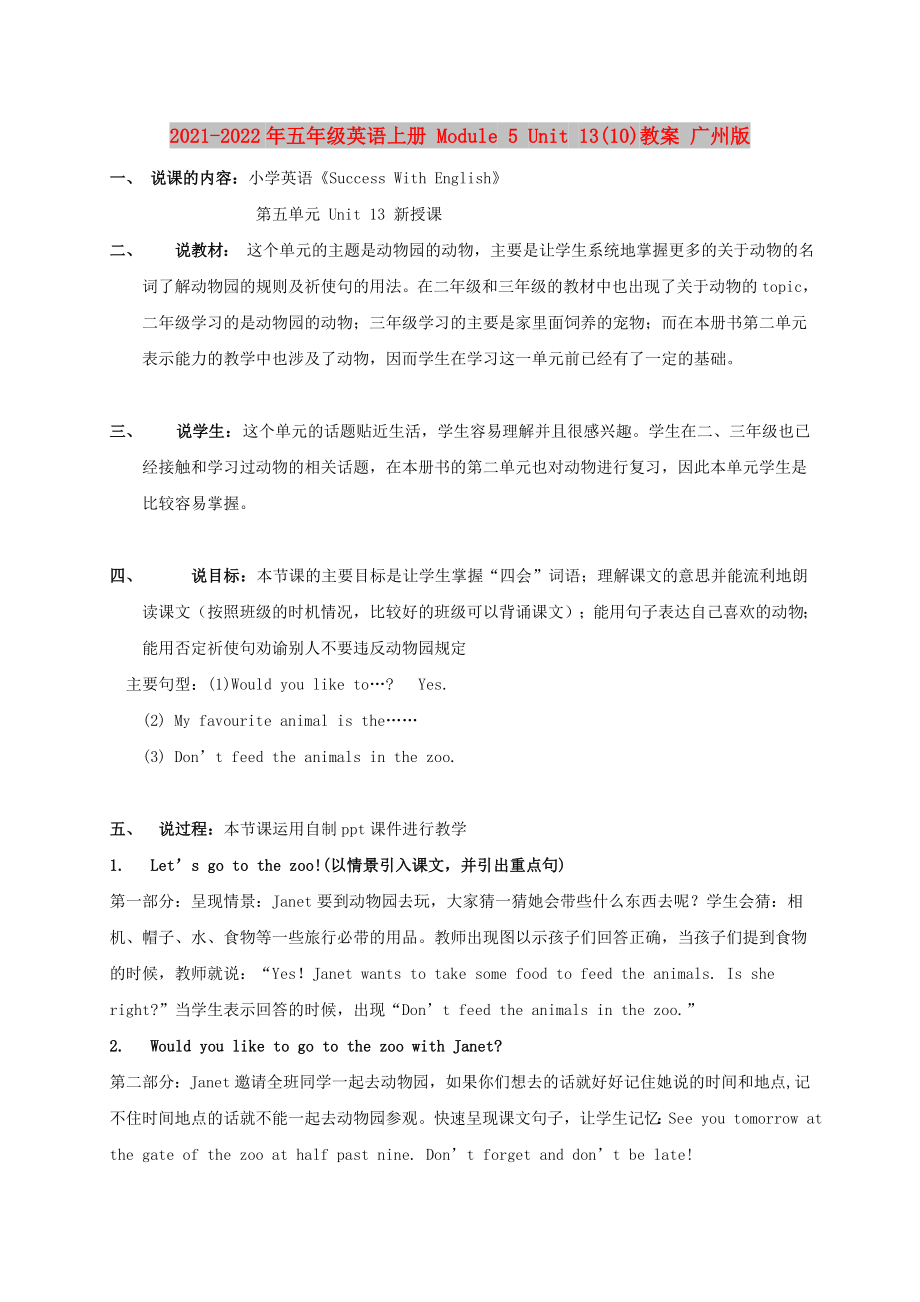《2021-2022年五年級(jí)英語上冊(cè) Module 5 Unit 13(10)教案 廣州版》由會(huì)員分享�,可在線閱讀,更多相關(guān)《2021-2022年五年級(jí)英語上冊(cè) Module 5 Unit 13(10)教案 廣州版(4頁珍藏版)》請(qǐng)?jiān)谘b配圖網(wǎng)上搜索�。
1、2021-2022年五年級(jí)英語上冊(cè) Module 5 Unit 13(10)教案 廣州版
一�、 說課的內(nèi)容:小學(xué)英語《Success With English》
第五單元 Unit 13 新授課
二、??說教材: 這個(gè)單元的主題是動(dòng)物園的動(dòng)物�,主要是讓學(xué)生系統(tǒng)地掌握更多的關(guān)于動(dòng)物的名詞了解動(dòng)物園的規(guī)則及祈使句的用法。在二年級(jí)和三年級(jí)的教材中也出現(xiàn)了關(guān)于動(dòng)物的topic,二年級(jí)學(xué)習(xí)的是動(dòng)物園的動(dòng)物�;三年級(jí)學(xué)習(xí)的主要是家里面飼養(yǎng)的寵物;而在本冊(cè)書第二單元表示能力的教學(xué)中也涉及了動(dòng)物�,因而學(xué)生在學(xué)習(xí)這一單元前已經(jīng)有了一定的基礎(chǔ)�。
三、?? 說學(xué)生: 這
2�、個(gè)單元的話題貼近生活,學(xué)生容易理解并且很感興趣�。學(xué)生在二、三年級(jí)也已經(jīng)接觸和學(xué)習(xí)過動(dòng)物的相關(guān)話題�,在本冊(cè)書的第二單元也對(duì)動(dòng)物進(jìn)行復(fù)習(xí),因此本單元學(xué)生是比較容易掌握�。
四、???說目標(biāo):本節(jié)課的主要目標(biāo)是讓學(xué)生掌握“四會(huì)”詞語�;理解課文的意思并能流利地朗讀課文(按照班級(jí)的時(shí)機(jī)情況,比較好的班級(jí)可以背誦課文)�;能用句子表達(dá)自己喜歡的動(dòng)物;能用否定祈使句勸諭別人不要違反動(dòng)物園規(guī)定
主要句型:(1)Would you like to…? Yes.
(2) My favourite animal is the……
(3) Don’t feed the animals in the zoo
3�、.
五、?說過程:本節(jié)課運(yùn)用自制ppt課件進(jìn)行教學(xué)
1.? Let’s go to the zoo!(以情景引入課文�,并引出重點(diǎn)句)
第一部分:呈現(xiàn)情景:Janet要到動(dòng)物園去玩,大家猜一猜她會(huì)帶些什么東西去呢�?學(xué)生會(huì)猜:相機(jī)、帽子�、水、食物等一些旅行必帶的用品。教師出現(xiàn)圖以示孩子們回答正確�,當(dāng)孩子們提到食物的時(shí)候,教師就說:“Yes�!Janet wants to take some food to feed the animals. Is she right?”當(dāng)學(xué)生表示回答的時(shí)候,出現(xiàn)“Don’t feed the animals in the zoo.”
2.? Would
4�、you like to go to the zoo with Janet?
第二部分:Janet邀請(qǐng)全班同學(xué)一起去動(dòng)物園,如果你們想去的話就好好記住她說的時(shí)間和地點(diǎn),記不住時(shí)間地點(diǎn)的話就不能一起去動(dòng)物園參觀�。快速呈現(xiàn)課文句子�,讓學(xué)生記憶:See you tomorrow at the gate of the zoo at half past nine. Don’t forget and don’t be late!
3.? Guessing game通過游戲,幫助學(xué)生復(fù)習(xí)已學(xué)的動(dòng)物單詞
(1)看表示能力的句子猜動(dòng)物
(2)看圖的一部分猜動(dòng)物
4.? Free talk
用句型My
5�、favourtie animal is the…談?wù)撟约鹤钕矚g的動(dòng)物.
T:Do you like animals? Ps: Yes!
T:What’s your favourite animal?
Free talk后教師小結(jié):很多同學(xué)都喜歡動(dòng)物,所以我們要愛護(hù)動(dòng)物�,在動(dòng)物園玩的時(shí)候一定要記住:Don’t feed the animals in the zoo.
5.? 呈現(xiàn)課文�,然后跟老師讀課文、分小組讀課文�。
6.? 看重點(diǎn)詞試背課文。
附送:
2021-2022年五年級(jí)英語上冊(cè) Module 5 Unit 13(11)教案 廣州版
一�、 教學(xué)內(nèi)容分析:本單元學(xué)習(xí)有
6、關(guān)動(dòng)物的名稱及初步認(rèn)知祈使句�。
二、 教學(xué)目標(biāo):
1. To introduce and develop the pupils’ vocabulary of wild animals.
2. To introduce the target language don’t + verb in context.
3. To recycle the structure do you like.
三�、 學(xué)習(xí)方式:munication, corporation, set up the situation.
四、 Teaching procedures:
I. Warming up.
1.
7�、Greetings.
2. Songs. Animal Sound (p.60) show some pictures about animals.
II. Pre-task.
1. Free talk.
n Do you like this animal?
n Yes, I do.
n What’s your favourite animal? (mime an animal, then asks the other pupils to guess what animal it is.
2. Review the names of animals.
(1) Read the
8�、 words.
(2) Put the stickers. (p.61)
III. While-task.
1. Show a picture of the zoo, and then talk about it.
n Would you like to e to the zoo tomorrow with my family?
n Yes, I’d love to. / Thanks. That would be great!
n What can you take to the zoo?
n Camera/food.
n Can you feed the animals i
9�、n the zoo?
n You mustn’t feed the animals in the zoo.
3. Introduce the target language “don’t + verb in context.
__ don’t feed the animals in the zoo.
__ Don’t pick the flowers.
__ Don’t walk on the grass.
__ Don’t forget the time.
__ Don’t be late.
(write these sentences on the blackboard.
10、)
4. Games.( p.62 )
Simon says: Don’t stand up! / Don’t sit down. etc.
Ⅳ. Post-task.
1. Look and listen ( books closed )
2. Read after the tape.
3. Underline the key points.
4. Try to act out the dialogue.
5. Summaries: What have you learned in this lesson?
V. Homework
1. Listen and read the dialogue.
2. Make some sentences about “Do you …?
3. Recite the dialogue. ( 此題為選做題 )
 2021-2022年五年級(jí)英語上冊(cè) Module 5 Unit 13(10)教案 廣州版
2021-2022年五年級(jí)英語上冊(cè) Module 5 Unit 13(10)教案 廣州版

